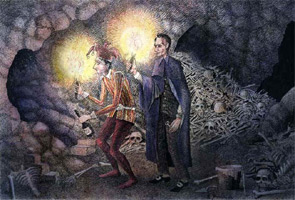In the beginning of Edgar Allan Poe’s classic short story “The Cask of Amontillado” the narrator addresses an audience with a phrase that begins, “You, who so well know the nature of my soul…” This phrase can have two effects, the first being that it causes trust in the speaker; certainly he can be trusted if the nature of his soul is known. At the same  time this phrase inspires trust, it also inspires skepticism; nothing has yet been revealed about the nature of the narrator’s soul. Why is the narrator attempting to inspire feelings of camaraderie and trust so early in the story? Very little about the narrator is known, aside from his retelling of the event. The narrator Montresor plots the murder of one of his friends, the duality of his actions and thoughts as well as the pure joy he exhibits from causing pain to another person create mistrust. The narrator of this story, to whom not even a name is assigned until the story comes to a close, cannot be trusted.
time this phrase inspires trust, it also inspires skepticism; nothing has yet been revealed about the nature of the narrator’s soul. Why is the narrator attempting to inspire feelings of camaraderie and trust so early in the story? Very little about the narrator is known, aside from his retelling of the event. The narrator Montresor plots the murder of one of his friends, the duality of his actions and thoughts as well as the pure joy he exhibits from causing pain to another person create mistrust. The narrator of this story, to whom not even a name is assigned until the story comes to a close, cannot be trusted.
 time this phrase inspires trust, it also inspires skepticism; nothing has yet been revealed about the nature of the narrator’s soul. Why is the narrator attempting to inspire feelings of camaraderie and trust so early in the story? Very little about the narrator is known, aside from his retelling of the event. The narrator Montresor plots the murder of one of his friends, the duality of his actions and thoughts as well as the pure joy he exhibits from causing pain to another person create mistrust. The narrator of this story, to whom not even a name is assigned until the story comes to a close, cannot be trusted.
time this phrase inspires trust, it also inspires skepticism; nothing has yet been revealed about the nature of the narrator’s soul. Why is the narrator attempting to inspire feelings of camaraderie and trust so early in the story? Very little about the narrator is known, aside from his retelling of the event. The narrator Montresor plots the murder of one of his friends, the duality of his actions and thoughts as well as the pure joy he exhibits from causing pain to another person create mistrust. The narrator of this story, to whom not even a name is assigned until the story comes to a close, cannot be trusted.The narrator shows his duality in regards to his treatment of Fortunato. Behavior towards Fortunato is described as being the same as it had been in the past; the narrator maintains his friendly demeanor while plotting his revenge against Fortunato. While imagining his revenge, the narrator is able to smile in the face of this person he hates and wishes ill upon. As the narrator lures Fortunato into the Catacombs he is complementing him and bribing him with expensive wine, all the while he is getting the man drunk and leading him to his doom. The narrator also initially pretends that he does not want Fortunato to come with him to the wine.
This ability to plot revenge while smiling in his enemy’s face also shows that the narrator has a truly violent nature. Not only does the narrator pretend to be this man’s friend and smile in his face while secretly hating him, the narrator actually gets pleasure out of planning these horrible acts. Indescribable is the pleasure felt by the narrator upon seeing Fortunato, but this is not pleasure derived from being in his presence it is pleasure derived from the satisfaction that the narrator will finally have his revenge on this man who he perceives has done him ill.
In the end Montresor has walled his friend deep underground and left him to die. A man who would act someone’s friend and later administer them a torturous murder should not be trusted. Upon viewing the narrators words and actions the true nature of his soul is revealed and we come to see Montresor. In the end he is given a name, he is not a mysterious narrator, he is a monster.
image source: http://www.mansioningles.com/lectura15.htm

No comments:
Post a Comment